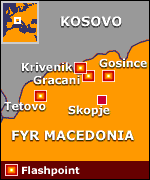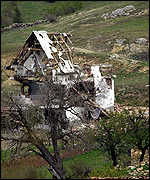 |
 |
 |  |
|
Home |
 |
 |
 |
| 1, March-2001. |
| 2, March-2001. |
| 3, March-2001. |
| 4, March-2001. |
| 5, March-2001. |
| 6, March-2001. |
| 7, March-2001. |
| 8, March-2001. |
| 9, March-2001. |
| 10, March-2001. |
| 11, March-2001. |
| 12, March-2001. |
| 13, March-2001. |
| 14, March-2001. |
| 15, March-2001. |
| 16, March-2001. |
| 17, March-2001. |
| 18, March-2001. |
| 19, March-2001. |
| 20, March-2001. |
| 21, March-2001. |
| 22, March-2001. |
| 23, March-2001. |
| 24, March-2001. |
| 25, March-2001. |
| 26, March-2001. |
| 27, March-2001. |
| 28, March-2001. |
| 29, March-2001. |
| 30, March-2001. |
| 31, March-2001. |
|
|  |
|
 |
Thursday. |
 |
Enter content here Macedonia clashes spread into Kosovo. BBC BBC Photo. American soldiers treat a casualty of the shelling. Reuters Photo. Polish KFOR soldiers treat Nuri Krasniqi, an ethnic Albanian villager from Krivenik who was wounded March 29, 2001 by Macedonian shellfire aimed at Albanian guerrillas operating in the area. Shellfire strayed across the border from the battleground in northern Macedonia into Albanian-dominated Kosovo, injuring civilians. REUTERS/Hazir Reka
- Mar 30 1:04 AM ET BBC Photo. Reuters Photo. Polish KFOR soldiers treat Nuri Krasniqi, an ethnic Albanian villager from Krivenik, who was wounded March 29, 2001 by Macedonian shellfire aimed at Albanian guerrillas operating in the area. Shellfire strayed across the border from the battleground in northern Macedonia into Albanian-dominated Kosovo, injuring civilians. REUTERS/Hazir Reka Thursday, 29 March, 2001, 14:34 GMT 15:34 UK
Fighting between Macedonian forces and ethnic Albanian rebels has strayed out of northern Macedonia, across the border into Kosovo.
Three people were killed and between 10 and 20 injured when shelling hit the village of Krivenik, which lies just 1km inside Kosovo.
One of the victims was British cameraman Kerem Lawton, who was working for Associated Press Television News (APTN).
The attack came as Nato-led international peacekeepers stepped up their patrols of the Kosovo-Macedonia border.
Macedonian troops are trying to drive the rebels from their strongholds in mountainous terrain close to the border.  Rebels hidden
Krivenik is separated by a mountainous ridge from Gracani, the Macedonian hamlet which is the focus of the current fighting.
American soldiers from the Nato-led force treated the casualties at a hastily-erected field hospital.
Macedonian troops have been using tanks, mortar and light artillery to shall positions held by the rebels near Gracani.
But the authorities have denied that Macedonian forces were responsible for the shellfire that fell inside Kosovo.
"The commander of operations in the Gracani area has said no Macedonian forces have used fire against targets inside Kosovo," said Defence Ministry spokesman Georgi Trendafilov.
A BBC correspondent who visited the area said up to 100 rebels of the National Liberation Army (NLA) have based themselves there, hidden in bunkers and shallow trenches.  A house in Gracani lies ruined after being hit by shells
Just a few days ago the Macedonian army was claiming significant progress in its efforts to drive out the NLA.
It had succeeded in pushing the rebels back from the hills around Tetovo, Macedonia's second largest city and the unofficial capital of its ethnic-Albanian community.
But so far their efforts around Gracani appear to have had little impact.
Nato steps up patrols
Nato forces along the Macedonia border are trying to cut off rebel supply routes.
Polish and Ukrainian troops already deployed in the area are being supplemented by some 400 British and Finnish troops equipped with sophisticated surveillance systems.
But the mountainous nature of the terrain in the border area which makes the task of both Macedonian troops and Nato peacekeepers difficult.
The BBC's defence correspondent, Jonathan Marcus, who is in Kosovo, says sealing the border with Macedonia is almost impossible.
The ethnic-Albanians are lightly armed and know the mountains well.
Political gesture
The Macedonian authorities say they are willing to start talks with the country's ethnic Albanians, who say they face discrimination, once the rebellion has been put down.
The European Union's top foreign policy adviser, Javier Solana, has urged Macedonia's political leaders to make a clear political gesture towards the Albanian community.
He suggested that the government in Skopje should invite ethnic Albanian leaders to a forthcoming signing ceremony between Macedonia and the EU.
A Macedonian delegation is due to sign a Stabilisation and Association Agreement - the first step to possible future talks on EU membership - in Luxembourg on 9 April. |
|
|
|
|
|



